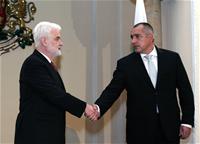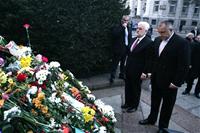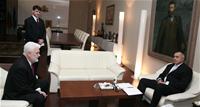We, the Serbs and the rest
Dessislava Dimitrova, March 1, 2011
 Following an unsuccessful first attempt to arrive in Bulgaria, due to technical problems with the government’s aircraft in December, Serbia’s Prime Minister Mirko Cvetkovic succeeded in his second attempt and landed in Sofia on Monday (February 21). It seems that he had very tight agenda and he and his Bulgarian counterpart Boyko Borissov had very serious issues to discuss, as all of a sudden the media statements, scheduled for the end of the first day of Cvetkovic's visit, were cancelled. The press offices of the two governments disseminated standard press releases, in which the only difference was that the one, sent from Belgrade was to some extent more detailed. According to the statements, both prime ministers concluded that good political relationship were the basis for successful economic cooperation.
Following an unsuccessful first attempt to arrive in Bulgaria, due to technical problems with the government’s aircraft in December, Serbia’s Prime Minister Mirko Cvetkovic succeeded in his second attempt and landed in Sofia on Monday (February 21). It seems that he had very tight agenda and he and his Bulgarian counterpart Boyko Borissov had very serious issues to discuss, as all of a sudden the media statements, scheduled for the end of the first day of Cvetkovic's visit, were cancelled. The press offices of the two governments disseminated standard press releases, in which the only difference was that the one, sent from Belgrade was to some extent more detailed. According to the statements, both prime ministers concluded that good political relationship were the basis for successful economic cooperation.
“So what?", some people might say. Just another visit of another prime minister to Bulgaria. Which could be the reason why just a few journalists decided it was worth attending the Bulgarian–Serbian economic forum on Tuesday, which appeared to be the only opportunity for media to find out more about the meetings between Cvetkovic and Borissov. During the forum the two prime ministers reiterated how close the two countries were and that even the translation headphones in the hall were useless, according to Cvetkovic, and that Bulgaria and Serbia should meet in a friendly volleyball game in the new sports hall in Sofia in the summer, in order to try their strength against each other, according to Borissov.
“In all our conversations we have always had just one starting point: united Europe, Balkans with transport corridors, with business, with infrastructure, with tourism, with economy, with innovation, on the contrary to the current situation: Belgrade is just 400 km away from Sofia but it takes maybe a day long to go there by car,” Borissov said. “During and economic and financial crisis we should talk less about love and more about money and about how to get the money here so that people here can live better … It is not that complicated, but is difficult,” he added.
Cvetkovic, who was all the time addressing his Bulgarian counterpart with “Dear, Boyko”, urged Bulgarian companies to invest in Serbia where there were favourable conditions for making business. He mentioned the South Stream gas pipeline, the highway that would connect the capitals of the two countries and, half-heartedly, the Belene nuclear power plant as the main common objectives of Bulgaria and Serbia before the forum came to an end. Instead of asking for more details about the talks between the two prime ministers, some of the journalists started asking questions on “the hot topics of the day”.
No questions on what both premiers had talked about, even though it could have been interesting to learn what piece of advice the Bulgarian prime minister had given, as being a member of the European Union, to Serbia, whose main foreign policy task is joining the EU. Because it would be really useful if someone pointed his own mistakes so they were not repeated in the future, bearing in mind the fact that Brussels recently threatened to restore visas for the Western Balkans because of the large number of refugees to EU countries.
However, the question about the highway between Sofia and Nis, which almost turned into mythical, managed to creep among all others. Cvetkovic mentioned, during the forum, that Serbia needed between two and two and a half years to complete its section of the project, while Borissov admitted that because of a delay due to the lack of a design project, Bulgaria would build its about 50 km by 2014.
Asked about the Belene nuclear power plant, the Bulgarian prime minister explained that “we have nothing to discuss about it with Serbia”. “We are awaiting an answer from the Russian party about “price and inflation index”, which meets the contract criteria,” he said, without providing details on what happened with Serbia’s intentions to take part in the project and if it had decided not to participate in it because of all the fluctuations of the Bulgarian position. Straight after that all  questions were transferred to the “conflict” between the countries on the commemoration of the Bulgarian national liberation fighter Vassil Levski in the Serbian town of Bossilegrad (Dimitrovgrad).
questions were transferred to the “conflict” between the countries on the commemoration of the Bulgarian national liberation fighter Vassil Levski in the Serbian town of Bossilegrad (Dimitrovgrad).
Cvetkovic’s visit reminds to a great extent the one of Serbian President Boris Tadic this summer in the Evxinograd summer residence near the Black Sea city of Varna, where there was no information provided in advance of the summit and the only statements available were upon Tadic’s arrival at the Varna airport. Obviously, all these visits (those of Cvetkovic and Tadic, and the one of Borissov to Serbia last spring) have something in common, a joint aim, but it is not clear whether it is the economic projects or whether Bulgaria's assistance to Serbia on its EU accession road, or something else.
 And if you happen to ask yourself what is it all about in this situation, Radoslav Petkovic, a journalist with Belgrade-based Blic newspaper has put it all crystal clear in an article, published last month and called “We, the Bulgarians and the rest”. “The mutual contempt and inferiority complex towards the West are typical Balkan features, but the problem is that none of us is better or worse than the other. We know nothing about Bulgarian history but we think that they are primitive and wild. And they think likewise, there is no need to lie to each other. […] If we knew more about the Bulgarians, maybe we would respect them more”. A statement, very close to what Radovan Jelasic, former Serbian central bank governor, told euinside in an interview in Istanbul in 2010. He then said that is was high time politicians on the Balkans to step back and let cultural similarities between the countries a bigger role in the region.
And if you happen to ask yourself what is it all about in this situation, Radoslav Petkovic, a journalist with Belgrade-based Blic newspaper has put it all crystal clear in an article, published last month and called “We, the Bulgarians and the rest”. “The mutual contempt and inferiority complex towards the West are typical Balkan features, but the problem is that none of us is better or worse than the other. We know nothing about Bulgarian history but we think that they are primitive and wild. And they think likewise, there is no need to lie to each other. […] If we knew more about the Bulgarians, maybe we would respect them more”. A statement, very close to what Radovan Jelasic, former Serbian central bank governor, told euinside in an interview in Istanbul in 2010. He then said that is was high time politicians on the Balkans to step back and let cultural similarities between the countries a bigger role in the region.
 Bakir Izetbegovic, Andrej Plenkovic | © Council of the EU
Bakir Izetbegovic, Andrej Plenkovic | © Council of the EU Aleksandar Vucic, Recep Tayyip Erdogan | © Serbian Presidency
Aleksandar Vucic, Recep Tayyip Erdogan | © Serbian Presidency Jean-Claude Juncker, Zoran Zaev | © European Commission
Jean-Claude Juncker, Zoran Zaev | © European Commission